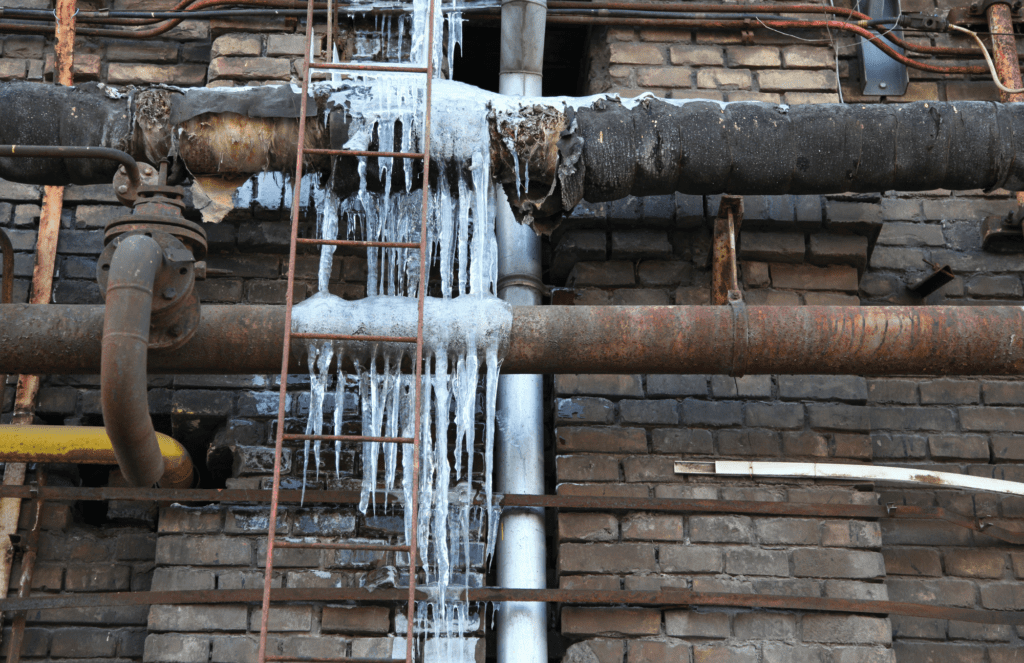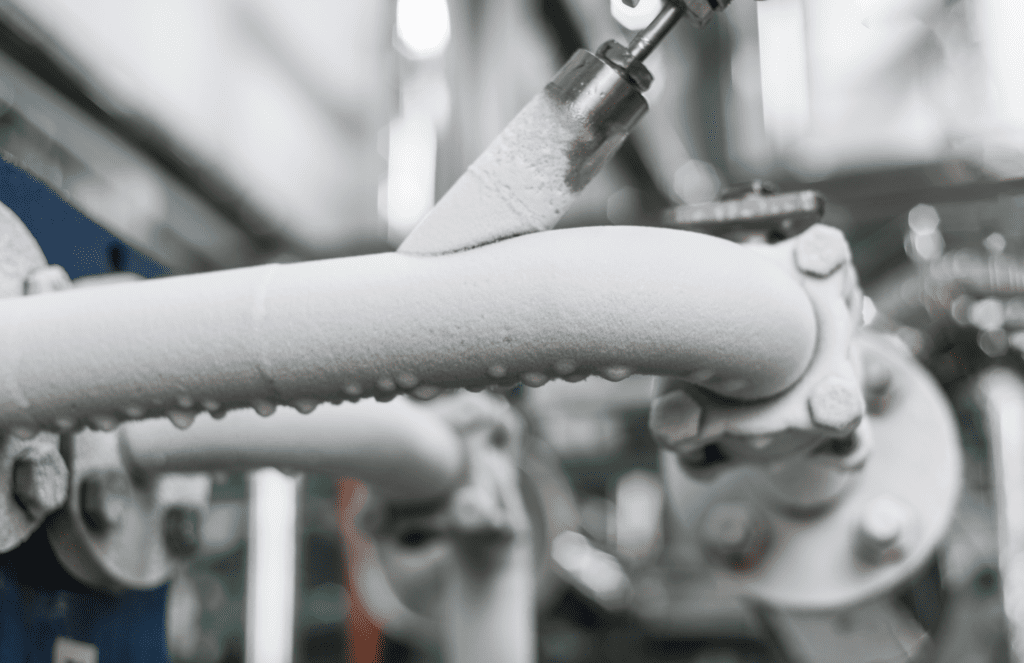As winter brings its chilly embrace, the risk of frozen pipes becomes a concern for homeowners in Brooklyn. Frozen pipes can lead to significant damage and inconvenience, making it essential to adopt preventive measures.
In this blog, our team of Brooklyn plumbing service has added an extensive list of effective winter plumbing tips to keep your pipes warm and your home snug throughout the colder months.

Understanding the Threat of Frozen Pipes
To fortify your home against the winter menace of frozen pipes, it is important to understand how this damaging weather phenomenon can impact your pipes. As temperatures plummet, particularly during sub-zero nights, the water coursing through your plumbing system becomes susceptible to freezing, setting off a chain reaction of potentially harmful consequences.
Temperature-Induced Freezing: The primary catalyst for frozen pipes is, unsurprisingly, the drop in temperature. When the mercury plunges, the water within your plumbing infrastructure is vulnerable to the transformative process of freezing. This phase change from liquid to solid sets the stage for a cascade of challenges.
Expansion and Pressure Buildup: As water transitions into ice, a notable transformation occurs—expansion. Ice occupies a larger volume than water in its liquid state, exerting significant force on the confines of the pipes. This expansion leads to an increase in pressure within the plumbing system, creating a potentially destructive scenario.
Risk of Cracks and Leaks: The heightened pressure within the pipes due to ice expansion becomes a critical point of concern. This increased pressure can result in the formation of cracks along the interior surfaces of the pipes. These minute openings, often invisible to the naked eye, pose a gateway for water to escape, initiating leaks that can cause damage over time.
Potential for Burst Pipes: In more severe cases, extreme pressure and weakened pipe structures can culminate in a catastrophic event—a burst pipe. The force exerted by the expanding ice can overwhelm the structural integrity of the pipe, leading to a rupture. A burst pipe not only results in immediate water damage but also necessitates urgent repairs to prevent further harm.
Implications for the Plumbing System: The ramifications of frozen pipes extend beyond immediate structural damage. Persistent freezing and thawing cycles can weaken the overall resilience of the plumbing system. Over time, this can compromise the integrity of pipes, making them more susceptible to future issues and reducing their lifespan.
Impact on Home Structures: The consequences of frozen pipes are not limited to the plumbing infrastructure alone. Leaking or burst pipes can inflict considerable damage on the structural components of your home. Ceilings, walls, and flooring may suffer water damage, necessitating extensive repairs and restoration efforts.
Health and Safety Concerns: Beyond the structural and financial implications, frozen pipes can pose health and safety concerns for occupants. Water leaks and mold growth resulting from prolonged exposure to moisture can compromise indoor air quality, potentially leading to respiratory issues and other health hazards.
Environmental Impact: The environmental impact of frozen pipes is an often overlooked consideration. Unaddressed leaks or burst pipes can contribute to water wastage, burdening local water resources. A proactive approach to preventing frozen pipes aligns with sustainable practices and responsible water usage.
By understanding the dynamics behind frozen pipes, homeowners are better equipped to implement winter pipe care. From insulation strategies to maintaining optimal indoor temperatures, addressing the root causes of frozen pipes becomes essential in safeguarding both your plumbing system and the overall well-being of your home.

Winter Plumbing Tips for Pipe Care
Let’s look at the extensive array of proactive measures and winter plumbing advice designed to shield your pipes from freezing temperatures and potential damage.
Insulate Exposed Pipes: Insulation is your first line of defense. Pipes located in unheated areas, such as basements, crawl spaces, or attics, are particularly vulnerable. Insulate these pipes using pipe sleeves or heat tape to prevent exposure to freezing temperatures.
Seal Cracks and Leaks: Inspect your home for any gaps, cracks, or openings where cold air can infiltrate. Seal these entry points to keep the cold out and the warmth in. This not only benefits your plumbing but also enhances overall energy efficiency.
Maintain Adequate Heating: Keep your home adequately heated, especially during extreme cold spells. Ensure that your heating system is functioning optimally to maintain a consistent temperature throughout your home, preventing pipes from freezing.
Open Cabinet Doors: Allow warm air to circulate around pipes by keeping cabinet doors under sinks open, especially in kitchens and bathrooms. This simple practice helps maintain a slightly higher temperature around the pipes, reducing the risk of freezing.
Let Faucets Drip: During particularly cold nights, allowing faucets to drip slowly can prevent water from standing still in the pipes, reducing the likelihood of freezing. This is especially useful for pipes located along exterior walls.
Disconnect and Drain Outdoor Hoses: Before the winter chill sets in, disconnect and drain outdoor hoses. If left connected, water can freeze inside the hose and extend into the connected pipe, leading to potential freezing and bursting.
Install Frost-Free Hose Bibs: Consider installing frost-free hose bibs, especially in outdoor areas. These bibs are designed to prevent freezing by allowing water to drain out when the faucet is turned off.
Keep Interior Doors Open: Maintain consistent heating throughout your home by keeping interior doors open. This promotes better air circulation and helps prevent certain areas from becoming colder than others.
Utilize Space Heaters Safely: Consider using space heaters in areas with exposed pipes, such as basements. Ensure safe operation by following manufacturer guidelines and keeping flammable materials away from the heater.
Schedule Plumbing Inspections: Regularly schedule plumbing inspections with local experts, such as Brooklyn plumbing services. Professionals can identify vulnerable areas, detect early signs of issues, and provide necessary repairs or insulation.
Emergency Preparedness: What To Do When Pipes Freeze
Despite best efforts, emergencies can still happen. If you suspect your pipes are frozen, here is some emergency winter plumbing advice for you:
Turn Off Water Supply: Shut off the water supply to the affected pipe immediately to minimize potential damage. This can be done at the main water shut-off valve in your home.
Thaw Pipes Safely: Use a hairdryer, heat lamp, or electric heating pad to thaw the frozen pipe gently. Avoid using open flames or excessive heat, as this can damage the pipe.
Contact Emergency Plumbing Services: If you cannot thaw the pipe or if there is a burst, contact emergency plumbing services near you immediately. Quick action can mitigate damage and prevent further issues.
Where Can I Find Emergency Plumbing Repair Near Me?
If you live in Brooklyn, look no further than Nationwide Plumbers for your emergency plumbing service. We have over 40 years of experience in serving our local community. Our licensed and insured plumbers are always on standby to help you out of your plumbing emergencies, no matter the time of the year.
Contact us today at 718-748-2727. Ensure your pipes are winter-ready with our reliable and efficient solutions.
